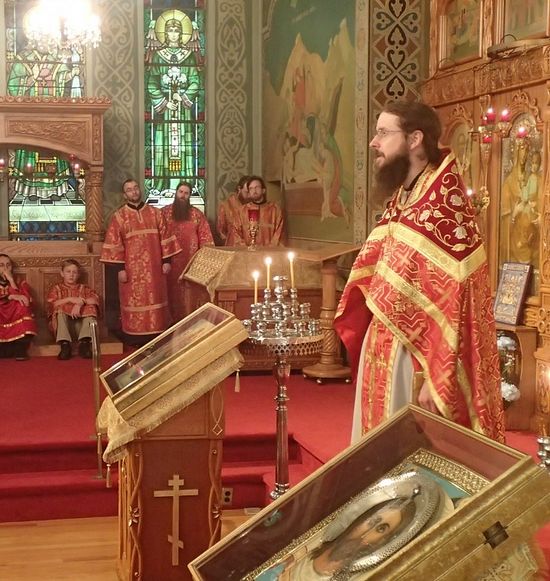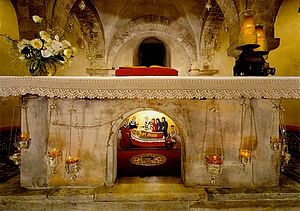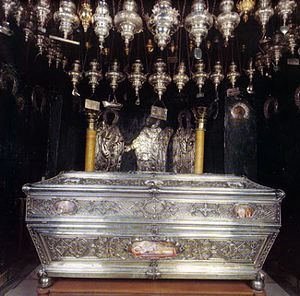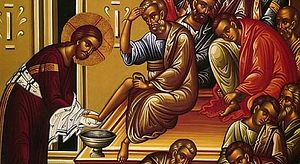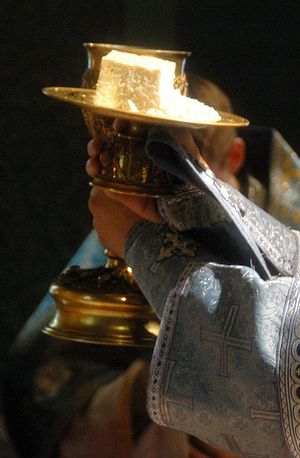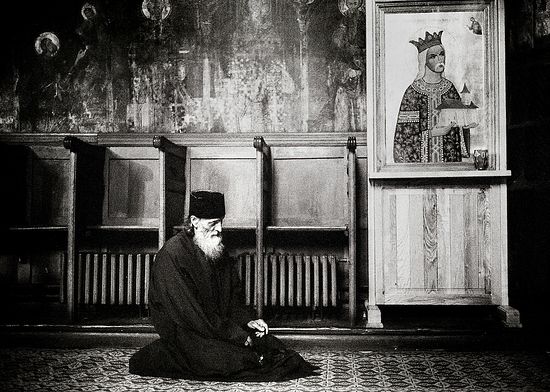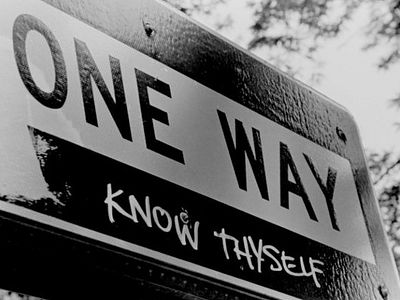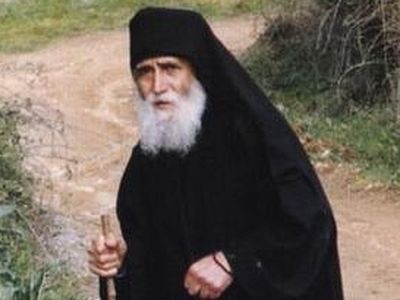On August 22, 2015, Schema-Archimandrite Sergius, abbot of St. Tikhon’s Monastery delivered an address to the annual Women’s Retreat sponsored by the Department of Curriculum and Education of the Diocese of Philadelphia and Eastern PA, held at St. Tikhon’s Monastery and Seminary in Waymart, PA, on the topic of “Orthodox Living in the Modern World: Steps to Spiritual Transformation.”
In his talk Fr. Sergius spoke on several important themes, including the benefits of pilgrimage for helping us to encounter God, the power of the saints, moving away from an inner monologue towards a dialogue with God beginning with a consistent prayer rule, and having an attitude of blessing and thanksgiving.
It is evident that his words stem not merely from study, but from a life lived in the Church through monasticism, and therefore they can be of benefit to us all.
* * *
On the Importance of Pilgrimage
I’d like to welcome you to the monastery and seminary. It’s always a blessing to have you come to visit us here on pilgrimage. We’ve really lost sight in our society as a whole of this idea of pilgrimage. It almost sounds medieval and conjures up images of people on their knees going to some holy site. The idea of pilgrimage is sometimes strange to us and yet it’s extremely important for us to encounter and experience the Lord. Our faith is so experiential.
Christ Himself, when the apostles asked him, Where do You live, says, Come and see. And then when the disciples are telling other potential disciples about the Lord they simply say Come and see. That’s the most important part of our faith, that it’s so real and tangible. Pilgrimage is part of that experience. It’s about being able to encounter God in a very immediate and a very close way that’s very transformative and inspires us and renews us, giving us hope and life.
I was just in St. Nicholas Church in Bari, Italy where St. Nicholas of Myra in Lycia is.[1] Sometimes we don’t realize that the saints are so powerful that even in the midst of a society that rejects saints, and the Church, and even the Lord, still the power of St. Nicholas is coming up through the ground and manifesting itself in our society in a very profound and real way. St. Nicholas knows everything we’re thinking, whether it’s naughty or nice and he can see and knows what’s going on, because he is united with God and that means he’s everywhere. He’s able to bestow upon us great gifts of grace, and even material gifts like he did in his life. He’s still working tirelessly.
Going to encounter that great saint in Bari was such a blessing and it reminded me of the critical place of pilgrimage in our life. I was renewed in that it is very important for us to experience these things and be changed by these things. You can go and touch St. Nicholas. They have myrrh that comes out of his tomb that they collect once a year. It’s a beautifully smelling white myrrh that they mix with water to give to pilgrims.
On Relics and the Role of the Body in Salvation
Encountering this powerful intercessor, I am reminded of the universality of our Church and the importance of encountering our faith in a very real way. What is the center of our faith if not the Eucharist? We taste and see that the Lord is good. The Church addresses every sense. Every part of us is engaged by the Church if we allow it to be. The Church wants to sanctify every single part of us, every single molecule.
An incorrupt saint is the by-product of that sanctification process. The Holy Spirit dwells in people so much that even their body doesn’t decay anymore. Our body is a very important part of the whole process of salvation. It’s a reality that we need the body to actualize our works and repentance. Not all saints are incorrupt, but it is a sign of the indwelling grace of the All-Holy Spirit which keeps us together, not only in soul but also in body, sometimes in so much superabundance that these saints remain incorrupt, awaiting the Second Coming.
I was just reading the words of Christ this morning that, And whosoever liveth and believeth in me shall never die (John 11:26). Never die. That’s the main enemy, as St. Paul says. He says that that last great enemy to be conquered is death. That’s what Christ comes to address, that we might have life, and more abundantly. Superabundant life it says in the Greek, and so these saints who are so filled with that life don’t decay.
Across form Bari is Corfu, where are the incorrupt relics of St. Spyridon, which not just incorrupt in the typical way. They say that they actually have to change his worn-out shoes every few months because he’s out and about doing things. You may kind of laugh and think that’s very strange, but once Archbishop Benjamin (OCA) was telling stories about Alaska, and he told us that when they canonized St. Herman in 1970, many of the natives did not know that he had died, because he was still active. He’s still working. If they die in the Lord they never see death.
On Facing Ourselves
The fathers say that when we die the only thing we can take with us is that which we have given away, and even more importantly we take the disposition of our heart. Was it oriented towards God and the good things of life and love, or was it oriented towards ourselves, which is, in a way, death? What was the principal movement of repentance in the parable of the prodigal son? He came to himself. He had forgotten himself. There is no movement towards God that doesn’t start with moving back to myself. Spiritual life is always a movement to the heart and then to God, because I can only speak to God from my heart.
Our prayers are sometimes not answered because we pray like a talking head disconnected from our heart: “I want this, I want that, please help me, help me ...” and therefore He doesn’t hear them. We have to come to ourselves every time we go to pray. The reality of the Fall is this: a movement away from ourselves out to the created world—cars, family, boat, worries about jobs, even about good things like Church. This movement away from the heart gets us so distracted and scattered that we have nothing of true content to offer, and we feel so frazzled sometimes.
One of the most important things we can do in this life is to make time for God which is really time to come back to ourselves, to our heart, because this is the first movement and if we don’t realize the first movement then the second movement, back to God, cannot happen. The movement back to the heart is a movement to my own self, and sometimes we don’t want to face this because it’s so difficult, ugly and scary. Me.
The hardest thing to face is the truth about ourselves. It’s really hard. We pay entertainers hundreds of thousands of dollars every year to distract us from ourselves, and from the reality that this world is dying. It’s sad but true. It’s because we don’t want to face the reality of ourselves, and by extension our lives, which might be dysfunctional or have problems. It’s much easier to run to pseudo supports instead of real supports.
As we get older, the tendency is to continue receding away from people, back into ourselves, becoming more isolated. It’s weird but that’s the reality, because we don’t like pain. It’s a very difficult reality to face sometimes. But how do we cope with pain? Unfortunately we go the wrong direction—we go back to pleasure. And then we get stuck in this vicious cycle of pain and pleasures, and it’s this never-ending wheel that we’re stuck in like a hamster until our last days.
On The Divinity of Christ as Our Rock
The most important component of Orthodoxy is that Jesus Christ is the Word made flesh, and this Word is eternal. There was never a time when Jesus Christ was not. We live in time, and therefore we have a sense of past, present, and future, but in God there only is. God just is. Jesus Christ is God and He always was and He always will be. St. John says in his epistle, this is the victory that overcomes the world—by your faith, by the power of the Holy Spirit working in your heart you understand that Jesus Christ really is Who He said He was.
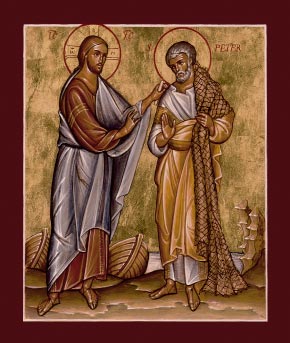
This rock confession of our Lord’s divinity needs to be the foundational support in our lives, because it gives us power to overcome the death that so easily tempts us. It changes the whole way we view the world and ultimately how we interact with God, and it’s something that’s a progressive movement. As we continue to unfold this reality of Who Jesus Christ really is it never ends. Understanding Who Christ is is something that will go on even in eternity. St. Maximus says even those who are saved will know only a little bit about Him, because the reality of the Incarnation is so big.
The reality is that you were created to be the temple of the Holy Spirit, so that God in all of His infinite majesty could depart His life to you. That’s what salvation is. It means to receive God’s life in all of its totality in your heart and in your life and to be so united with God, without confusion, that His life becomes your life. When God’s eternal life becomes yours that means you’re saved.
Salvation is a process. Just because we’re baptized and chrismated and we received communion, we went to confession that doesn’t guarantee anything because we’re mortal and corruptible. There are no certainties except that God love us and wills our salvation and that eventually we’re going to pass from this world. Those are the certainties. So having more support and recognizing our need for that is so important.
On Our Inner Monologue
Often times we ask “Why God?” And on the Cross Christ Himself asked My God, My God why have You forsaken Me? Of course, He is perfect God but also perfect man, and in His Humanity He was descending into death, into the nether regions where God was not, and yet He was God. It’s a great paradox. Even Christ on the Cross is echoing our pain and reality. So often we ask God “Why?” and it’s not a bad question if we ask in the form of a prayerful question, rather than accusing like the bad thief and then turning back in on ourselves. It’s time to step out of that monologue. It’s our task as spiritual Orthodox Christians to have a dialogue with God.
It’s very easy to carry on a monologue with ourselves, even when we’re surrounded by others. We have judgmental thoughts and that is just an inner monologue. Sometimes we can’t stop it because it’s just inferences about reality, but St. John Chrysostom says that the difference between judging somebody with condemnation and having simply made an observation is that the true Christian will always look with a merciful and empathetic eye. There will always be an attempt to encounter the person as the image of God and temple of the Holy Spirit who has value not because of what they do, but because they are.
The most important thing is that when we are in that critical mode we have to realize first and foremost that everybody is struggling: “Be kind because everyone you meet is fighting a hard battle.” That’s the reality. No matter how hard it is, if I can say in my heart a small prayer: “Lord help us both because we’re all struggling,” in that moment everything qualitatively changes. More often than not we are the generators of our downfall, but spiritual life is about always being able to say, “It’s not you—I need to work on myself.” Considering that I could be wrong, and not objectifying the other person will make my life a thousand times better.
On Humility and Blessing
We’ll never be able to help anyone unless we can put ourselves below them. Christ comes not to be served but to serve. He takes the bowl, He takes the towel, and He starts washing feet—God, washing feet, in service, in humility, in the sense of deference. Unless we can put ourselves on a lower place we’ll be doomed before we start, but if I come in the name of the Lord and I put myself underneath you and assume the best about you and only the worst about myself, there’s a chance that God might be able to work through me.
If I always assume the worst about others, what does that say about my own heart? It says that something is not quite right there, because God made this world good. No matter how much you struggle you are all good. St. Maximus says the inner vivifying principle of all creation is the Holy Spirit—He isn’t absent from anybody or anything. Of course He can fill us more and our job as Christians is to be more filled with God’s light, but on the level of this creation it is good, and it’s God’s. Therefore when we have judgmental thoughts there always needs to be an addendum: “Who is he to speak to me that way?”— but then say, “But Lord have mercy and help us both.” It needs to become a prayer and an opportunity for empathy rather than a moment of condemnation, which is only of our own selves, because whatever way we judge we will be judged in that same way.
Often when we judge someone for some mistake, we immediately make that same mistake, and we don’t realize that we’re doing it to ourselves. That’s a hard thing to understand, but the more we understand about the heart and about God we realize that whatever we sow we’re going to reap. The principle about this is this: things may be difficult, and you may be suffering, but thank God anyways. People may be rude, unkind, un-Christian, but be kind anyways. Your family might not love you and the people at work might not love you, but love them anyways. And we do this all in the name of the Lord. We say, “Lord, help me to do this.” “Lord, bless them.”
And this is the most powerful thing I can offer to you. If you always come with the shield of blessing, blessing everybody and everything at all times, God will be with you. In all places at all times in all things we need to carry this shield of blessing because all of this stuff is coming at us like arrows—harsh words, judgments, criticism, family problems—the shield of blessing is our hope and salvation, and in the process we protect ourselves and become good, no matter what. St. Silouan says by thinking evil we become evil. That’s why the Lord says not to curse or hate your enemies, because in doing that we curse ourselves.
On Finding Our Heart
Becoming aware of the state and reality of the heart is essential for us, and to help do this it’s incredibly important for us not only to read a chapter from the Gospels every day, but also to do something I call the Five and Five Rule. This is the minimum amount of time you can take for yourself before the Lord to become aware of your heart and begin some kind of spiritual life. Make five prostrations to the ground, saying the Jesus Prayer,[2] involving the body in a movement towards God, which is essential.
If I’m having difficulty with somebody and they’re having difficulty with me I pray, “Lord, Jesus Christ, Son of God, have mercy on me, a sinner.” And the more trouble there is, the more you do. This is the shield of blessing. In one and the same movement you protect yourself and you impart God’s blessing to that person. Whenever I have difficulty with somebody I always pray, “Lord, Jesus Christ, Son of God, have mercy upon your servant and grant them to be open to reconciliation,” and it’s never failed.
Start with five prostrations, and then for five minutes stand quietly in front of the icon corner and say the Jesus Prayer. It’s not a mantra, but a dialogue—it’s the name of our Lord and God and Savior and He said Whatever you ask in My name I will give it to you. Asking for God’s mercy is asking for His Life, His grace, and His love. Say it out loud and be with the Lord for five minutes. The main thing is to be present to yourself and to God. Then in the silence in-between the words there‘ll be an opportunity to listen to God. It’s a receptive place. After that you can say some morning or evening prayers and then read your chapter from the Gospels and say “It is truly meet to bless thee O Theotokos …” and “Through the prayers of our holy fathers … “ and that’s it. It takes ten minutes, but it’s ten absolutely essential minutes in our movement as the Church towards God, and towards understanding ourselves and each other. The closer I come to God the more I understand about myself and the more I’ll understand about you.
Prayer is about the movement back to my own heart so I can offer a movement to God. In that moment the heart begins to percolate and I begin to process and understand things and I can get some inclinations and intuitions about reality, myself and others. As I’m praying sometimes unclear things become clear, and things that are in the heart that we need to look at come to light. And this is something that encourages us how to be. It’s part of being rather than doing.
On Standing in the Presence of God
Why is it that we rush to get to Church and then we just stand there? The Church does that to teach us how to be, and moreover how to be in God’s presence, because for all eternity we’re going to be standing before the face of God, and our life is a preparation to learn how to stand in God’s presence and not be burned, not suffer in that presence. As it says in St. Paul’s epistle to the Hebrews: Enduring seeing Him that is invisible and unendurable. You can’t even look at the sun in the sky, and we are talking about the Maker of the sun, the Almighty God. This is an intensity that we cannot fathom.
We need to learn how to stand in the presence of God, and how to live and be with God, and the Church is the place where that happens, but it doesn’t happen in Church if we don’t have an opportunity to pray and process at home. It is the most important time that we can give to ourselves because it gives us perspective on how we need to proceed. A lot of times as we stand and abide in God’s presence, we must endure the cross of suffering and temptation. There is no resurrection without the cross, and the cross is that work we do in order to find resurrection. We embrace the cross not because we like suffering but because suffering is inevitable and so we redeem it, in the name of the Lord. It’s this suffering that enables us to bear God’s presence.
We don’t theologize in an armchair. We theologize on the cross.[3] When we endure difficult and painful moments in our lives we have an opportunity to become great theologians, because a greater depth of understanding of reality is disclosed to us through our own personal pain, which is inevitable. The question is are we going to offer it to God and move towards Him, or will we become insular and disbelievingly ask, “Why is God doing this to me?” without being willing to hear the answer and continue the dialogue with Him?
On Thanksgiving
The easiest way to become a spiritual person and to walk in God’s presence is to be thankful. St. Paul tells us in everything and at all times we should give thanks to God Because this is the will of God concerning you in Christ Jesus. This eucharistic perception and movement towards God helps to restore our world. It gives us perspective and an opportunity to see the sacramentality and the gift of this world. This world is a gift from God to us. What is the only thing I can do when I receive a gift except say, “Thank you?” Some of the hardest people to deal with are those who are unthankful—but we’re like that sometimes with God. But the more thankful we are the more it’s going to help us to see reality as it is: it is God’s gift to us.
When we give thanks we’re only fulfilling the movement of the Liturgy. The quintessential movement of the Liturgy is to take this world in the form of bread and wine and to offer it go God and to say “Offering it to Thee, Thine own of Thine own, on behalf of all and for all,” and then it becomes for us God Himself? We offer this world to God and we receive it back as a point of communion with Him rather than a point of separation like it was in the Garden. This world used for itself, selfishly apart from God, separates us from God; but used for offering it becomes our eucharist. The more thankful we become the more prayerful we’ll be and the more we will realize that God is in everything, working all the time, and that God ultimately is and He loves us. This is all a sign of his love.
On the Characteristics of God
In this world, God is not necessarily so active. We are the active principle in this world, but St. Maximus says in the next world God will be the active principle and we’ll be passive, which is why it’s called eternal rest. In this world, God is watching to see what we do. He’s active but very reserved. I’m phenomenally amazed that God doesn’t sometimes yell at us like a parent watching out the window, but that’s the great humility of God. God is characterized first and foremost by His great love and His great humility. Even in the midst of all the craziness of our world, He’s quiet. He doesn’t come out in lightning bolts, shooting people.
Many times the things we suffer aren’t because of God. There are the things He allows and the things He wills. He doesn’t will natural disasters and the terrible deaths of our family and friends, but He allows them, because He lets us be free. This world is not like robots. God respects our freedom so much, and in the most important way that is what it means to be made in God’s image—that is the core of it—to be totally free to choose God or to reject Him, to follow God or not to follow God. That is the great gift of life and of being made in God’s image. That’s what it means when Fr. Sophrony says that when God made man He made nothing less than Himself—He’s totally free.
On the Power and Purpose of Prayer
The most important thing we can do for people is to pray for them. To go up to somebody and say, “Pray for me,” is a sign of humility and openness and it’s extremely powerful. If someone you know is suffering it’s good to go to others and ask for prayer. We don’t have to be saints to see some amazing miracles with this. The power of prayer is real and it’s extremely transformative even for people outside the Church. So we need to be more open to not only to pray for people but to ask for prayers.
One time we really needed rain and the bishop went to the altar, got the book out and prayed for rain, said, “Amen,” put the book back, and it then started to rain. That’s what’s supposed to happen. That’s the power of prayer, and it’s especially real in the Church. Prayer is the most important thing.
The primary goal of prayer is communion with God. Conversation with God affects union with God, and union with God is what gives us our answer, because sometimes it’s not words but the peace that passes all understanding that allows us to deal with a situation. God won’t always just take away our hard situation—even in the garden Christ says, If it’s possible, take this from Me. That’s just human nature—shrinking from death.
Conversation with God is actually union with God, which saves us. Prayer as communion is what we always need to be thinking when we pray. When Moses spoke with God on the mountain he began to shine like the sun and they couldn’t even look at him, they had to put a towel over his head, because his conversation effected a union that blinded everyone else, and it will empower us to deal with the realities we need to face. Prayer attracts the grace that empowers us to overcome. It’s not the answers—because sometimes there are no answers.
